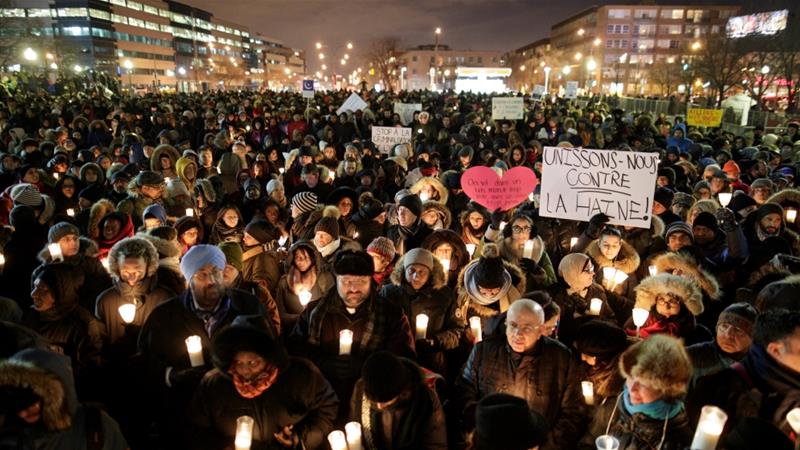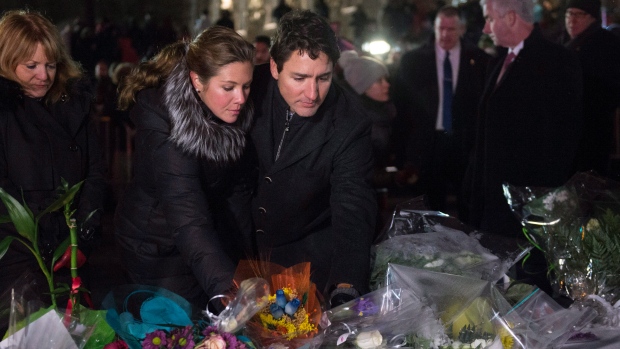
When the Indian-Canadian and later Indian-American novelist Bharati Mukherjee complained in the 1970s that Canada was more racist than America, many people thought she was harsh in her reading of the Canadian society. Only a handful of people told her that she was right. I personally think she was dead right. I can testify to her anguish in that I have lived in Canada and indeed experienced first-hand racism, the kind one does not notice because it is shrouded in a wonderful smile that is disconcerting, to say the least. It feels like a gesture of disillusion. It also resembles a hedge that screens a fence from sight. Unlike manifest racism in America, racism in Canada is latent.
The massacre of six Muslims caught in the act of praying to their God in Québec City on January 30 is a stark reminder of the xenophobic reality Muslims must face every day in a West that does not want them anymore. The fact that Canada as a whole rose to the occasion in order to comfort the victims of the bloodbath that took place at the oldest Mosque in Québec City last week is heartening. It is also very heartening to see Prime Minister Justin Trudeau observing all the laws of hospitality for those who came from afar to make their ‘home’ in Canada. He spoke movingly of the ‘home’ that is and the ‘home’ that never is.
Many immigrants have argued all along that Québécois people are by far more resentful toward the ‘Other,’ especially when that ‘Other’ happens to be Muslim, than the rest of Canadians. It is now doubtful that that very ‘Other’ will ever feel at ‘home’ in the Province of Québec no matter how reassuring the local government may be. This is so because the immigrant in the Province of Québec finds himself living in a narrow-minded, closed-in, provincial society that does not tolerate another way of seeing no matter how hard he conforms to their way of life: speak like them, dress like them, love the snow like them, laugh like them, eat like them. An odd feeling because one would have thought otherwise. After all, not so long ago the very Québécois who are racist today were the victims of Anglo racism yesterday. We tend to forget how they were mistreated, marginalized, degraded, and even branded the “white slaves of the north” for a long time by their masters, the Anglos. Their inferiority complex is still noticeable even today. In point of fact, the subaltern in Québec and indeed elsewhere in the West is the immigrant regardless of his origin. There is a withdrawal into oneself of sorts; worse, a turning in on oneself, you might say. The families that were robbed of their beloved ones will never feel at home in the world. The pain is too much to bear. Still, the irony lies elsewhere. They cannot go back to Algeria or Tunisia because they do not feel at ‘home’ in their country of origin either. They may not be able to go on living on borderline, but they must go on. Only one reason may help them look ahead. It lies in the swelling comfort they were given both in the Province of Québec and outside of it.
Even so, in the vanishing present one is tempted to feel angry like the bi-national fellow who when asked whether he feels fine in Québec City after 42 years of residence replied: “I do not feel safe here. I may go back ‘home.’” When the journalist retorted where he would go, he replied instantly and without hesitation: “Morocco.” That the Muslim who lives in the West feels beleaguered wherever he may be is indeed true. It is also true that some Muslims (I am thinking of the young men who committed heinous acts in Paris, Boston, Berlin, Nice, the list is too long) have made life difficult, if not impossible, for those of us who make or home in the West. Today, the Muslim is the fallen guy, the stereotype par excellence, the “vermin.” It is also fair to say that neither the Arab world nor the Islamic one has done much to alleviate the suffering of the typecast which has many rivers to cross before it is able to claim, if at all, a place in the sun.
The upshot of it all is that six innocent people were insensibly killed because a deranged young man decided on a whim that they must die. Where are the joys of yesterday when they were up and about? I have no answer to the question I pose here. For now, though, the orphaned families left behind are filled with a terrible sense of loss. They will need time to grieve for their loved ones. The out cold act of killing them also grieves us, the living, to see what we all saw in Québec City on that biting winter day.
An internationally renowned literary and cultural critic, Mustapha Marrouchi lives on borderline between the West and Rest. He is the author of half-a-dozen books, including The Fabric of Subcultures.












































